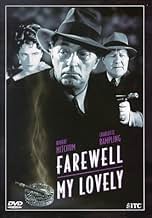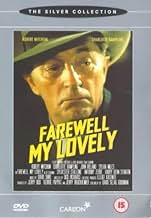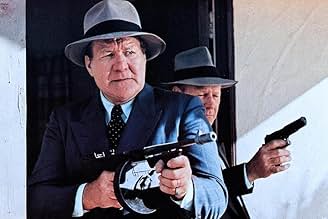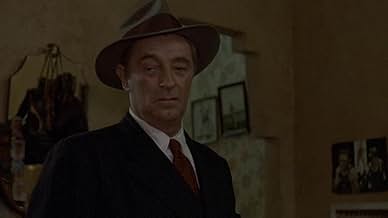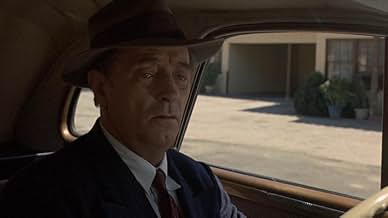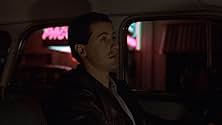Los Angeles private eye Philip Marlowe is hired by paroled convict Moose Malloy to find his girlfriend Velma, former seedy nightclub dancer.Los Angeles private eye Philip Marlowe is hired by paroled convict Moose Malloy to find his girlfriend Velma, former seedy nightclub dancer.Los Angeles private eye Philip Marlowe is hired by paroled convict Moose Malloy to find his girlfriend Velma, former seedy nightclub dancer.
- Director
- Writers
- Stars
- Nominated for 1 Oscar
- 1 win & 3 nominations total
Jimmy Archer
- Georgie
- (as Jimmie Archer)
- Director
- Writers
- All cast & crew
- Production, box office & more at IMDbPro
Featured reviews
Stylish remake of the much-filmed Chandler classic. Was Mitchum too old for the rolethat was the rap at the time. In hindsight, I don't think so, especially when he has that persuasive moment about aging near film's end. He certainly looks like he's climbed too many stairs and closed too many bars, but then that creates an unusual amount of pathos that deepens the role. Still and all, the passionate clinches with a sleek young Charlotte Rampling are borderline at best.
This is one of the few successful neo-noirs in my little book. Director Dick Richards and crew manage a funky look just right for the hard-boiled atmosphere of 40's detective fiction. Marlowe (Mitchum) drifts from one seedy venue to the next in his search for the mysterious Velma. But true to Chandler's slice-of-life LA, there's also a glimpse of the high- and-mighty in a Beverly Hills palace worthy of royalty. In fact, Marlowe resembles something of a pilgrim loner navigating greater LA in search of an elusive truth even after he's forgotten why.
Mitchum, of course, lowkeys all the way, hardly changing expression whether being roughed up by Moose Malloy or nuzzling up to Helen Grayle (Rampling). It has to be one of the more downbeat performances in private eye annals. But my Oscar goes to Sylvia Miles as the ultimate blowzy drunk (Florian). Her house is a mess, her hair is a mess, and her robe never quite fits in revealing ways Marlowe refuses to pick up on. Still and all, a fling with her looks more promising than an interlude with that plastic mannequin Marlowe does cozy up with. At the same time, Jack O'Halloran as the Moose comes across as the kind of pitiable dumb ox who would sacrifice everything for a faithless woman. In fact, the movie boils down oddly to something of a Samson and Delilah update.
But not everything is upside. The dialogue occasionally gets a little too cute, while the DiMaggio running thread seems forced at times. Nonetheless, it's a worthy version of the popular novel, and I'm just sorry that director Dick Richards hasn't been more active in the production end of the business. Judging from this film and the under-rated Culpepper Cattle Company, he certainly has the talent. And when an expressionless Marlowe comes to part with his money at movie's end, we finally glimpse that remote inner terrain and the heart of Chandler's heartless world.
This is one of the few successful neo-noirs in my little book. Director Dick Richards and crew manage a funky look just right for the hard-boiled atmosphere of 40's detective fiction. Marlowe (Mitchum) drifts from one seedy venue to the next in his search for the mysterious Velma. But true to Chandler's slice-of-life LA, there's also a glimpse of the high- and-mighty in a Beverly Hills palace worthy of royalty. In fact, Marlowe resembles something of a pilgrim loner navigating greater LA in search of an elusive truth even after he's forgotten why.
Mitchum, of course, lowkeys all the way, hardly changing expression whether being roughed up by Moose Malloy or nuzzling up to Helen Grayle (Rampling). It has to be one of the more downbeat performances in private eye annals. But my Oscar goes to Sylvia Miles as the ultimate blowzy drunk (Florian). Her house is a mess, her hair is a mess, and her robe never quite fits in revealing ways Marlowe refuses to pick up on. Still and all, a fling with her looks more promising than an interlude with that plastic mannequin Marlowe does cozy up with. At the same time, Jack O'Halloran as the Moose comes across as the kind of pitiable dumb ox who would sacrifice everything for a faithless woman. In fact, the movie boils down oddly to something of a Samson and Delilah update.
But not everything is upside. The dialogue occasionally gets a little too cute, while the DiMaggio running thread seems forced at times. Nonetheless, it's a worthy version of the popular novel, and I'm just sorry that director Dick Richards hasn't been more active in the production end of the business. Judging from this film and the under-rated Culpepper Cattle Company, he certainly has the talent. And when an expressionless Marlowe comes to part with his money at movie's end, we finally glimpse that remote inner terrain and the heart of Chandler's heartless world.
Farewell, My Lovely (1975)
A Truly Gorgeous, Vivid, Stylish Color Noir...Don't Prejudge it on 1940s Noir Terms!
This is a gorgeous surprise, a retreat forward, a 1940s drama not done in painful nostalgic pastel hues and soft edges, but in bold bright 1975 color and pitch dark shadow. You have to say the obvious and get it over with: yes, this is a modern "film noir." But it isn't a mere homage, nor a remake, nor a cheap imitation. Director Dick Richards, who has no other well known film to his credit, pulls a gem out of nowhere on this one. Just be sure to watch it for what it is, a dramatic period crime film, not for what you think it ought to be, a slavish remake of a classic noir. And he has the help of the perfect cinematographer for the subject, John A. Alonzo, who did both Chinatown (the year before) and eight years later, Scarface, both post-noir landmark crime films.
Of course, this version of Farewell, My Lovely is, strictly speaking, a remake, which is to say, it's the third movie based on Raymond Chandler's 1940 novel of the same name. And inevitably we are going to compare to the other great version, Dmytryk's 1944 true, early film noir (called Murder, My Sweet). I say other great version, because both are really fine films, and different enough to avoid copycatting. Farewell, My Lovely is actually the more original of the two, an irony after 31 years of influences. And in some ways it's better, mainly because it has Robert Mitchum very much in top form. He makes those beautifully concise and witty one liners seem real and fitting, as if people really did once talk like that. I wish they still did.
There are countless bit parts that pump up the stylishness of the movie, most memorably Sylvia Miles playing a hard-drinking has-been. And she and Mitchum have great chemistry, not as lovers, but as people from opposite sides of life who have a similar perspective on things, and they chat and resonate like old friends. (Compare this to the rougher, less involving scene in Murder, My Sweet.) Velma herself is none other than Charlotte Rampling, probably a hair miscast because Rampling has some kind of severity that the noirish femme fatales don't, as a stereotype, share. And this movie deals with stereotypes.
Mitchum above all. It's fascinating to see a movie that is meant to be fitting into a form well known enough to be able to both refer to (in style and plot) and to deviate from (so we can feel it's original intent). And to have Mitchum, with his decades of great, strong, roles, anchor it all makes for a sweet, almost poignant experience. A similar feeling might be had in the remake of Cape Fear, but for my money, this is the more interesting movie, whatever the limitations of the plot, and the big thug. Go ahead, compare the Dmytryk version to this Richards one. If you haven't seen either one, watch the more recent one first to give it a full chance. You might go away surprised.
A Truly Gorgeous, Vivid, Stylish Color Noir...Don't Prejudge it on 1940s Noir Terms!
This is a gorgeous surprise, a retreat forward, a 1940s drama not done in painful nostalgic pastel hues and soft edges, but in bold bright 1975 color and pitch dark shadow. You have to say the obvious and get it over with: yes, this is a modern "film noir." But it isn't a mere homage, nor a remake, nor a cheap imitation. Director Dick Richards, who has no other well known film to his credit, pulls a gem out of nowhere on this one. Just be sure to watch it for what it is, a dramatic period crime film, not for what you think it ought to be, a slavish remake of a classic noir. And he has the help of the perfect cinematographer for the subject, John A. Alonzo, who did both Chinatown (the year before) and eight years later, Scarface, both post-noir landmark crime films.
Of course, this version of Farewell, My Lovely is, strictly speaking, a remake, which is to say, it's the third movie based on Raymond Chandler's 1940 novel of the same name. And inevitably we are going to compare to the other great version, Dmytryk's 1944 true, early film noir (called Murder, My Sweet). I say other great version, because both are really fine films, and different enough to avoid copycatting. Farewell, My Lovely is actually the more original of the two, an irony after 31 years of influences. And in some ways it's better, mainly because it has Robert Mitchum very much in top form. He makes those beautifully concise and witty one liners seem real and fitting, as if people really did once talk like that. I wish they still did.
There are countless bit parts that pump up the stylishness of the movie, most memorably Sylvia Miles playing a hard-drinking has-been. And she and Mitchum have great chemistry, not as lovers, but as people from opposite sides of life who have a similar perspective on things, and they chat and resonate like old friends. (Compare this to the rougher, less involving scene in Murder, My Sweet.) Velma herself is none other than Charlotte Rampling, probably a hair miscast because Rampling has some kind of severity that the noirish femme fatales don't, as a stereotype, share. And this movie deals with stereotypes.
Mitchum above all. It's fascinating to see a movie that is meant to be fitting into a form well known enough to be able to both refer to (in style and plot) and to deviate from (so we can feel it's original intent). And to have Mitchum, with his decades of great, strong, roles, anchor it all makes for a sweet, almost poignant experience. A similar feeling might be had in the remake of Cape Fear, but for my money, this is the more interesting movie, whatever the limitations of the plot, and the big thug. Go ahead, compare the Dmytryk version to this Richards one. If you haven't seen either one, watch the more recent one first to give it a full chance. You might go away surprised.
L.A. of June 1941 as it was depicted in the Raymond Chandler's novel of the same title is filled with the dark secrets of the past that better stay uncovered. Philip Marlow, PE (Robert Mitcum) takes a job to find a vanished girlfriend of the felon Moose Malloy, and he has no idea what will follow. As Marlow searches for Velma Galento, he has to deal with a beautiful but cold and calculating seductress (Charlotte Rampling - young, sensual and dangerous), a jealous corrupt detective (Stanton), an old alcoholic girlfriend (Sylvia Miles in one of her two Oscar nominated performances, second - the shortest in the history of Oscars, for "Midnight Cowboy"), and a buffed thug (Sylvester Stallone -- it was fun to see him before he became a star of Rocky and Rambo).
This adaptation of Raymond Chandler novel features action, suspense, humor, mystery and Robert Mitchum in one of his best performances as a man struggling with cynicism, hatred, and betrayal.
This adaptation of Raymond Chandler novel features action, suspense, humor, mystery and Robert Mitchum in one of his best performances as a man struggling with cynicism, hatred, and betrayal.
This version of Raymond Chandler's classic detective novel is more faithful to the original book than the 1940s version filmed as 'Murder, My Sweet', and includes some of the racial and sexual aspects that weren't able to be included earlier. However despite being more faithful for me it still isn't as entertaining. And Robert Mitchum in his prime could act Dick Powell off the screen, but unfortunately as good as Mitchum is in this movie it's about twenty years too late for him to play Philip Marlowe. If Mitchum had starred in 'Murder, My Sweet' it would might have been THE definitive 1940s Noir, but comparing the two versions as they stand, Powell beats Mitchum hands down. Even so, there is a lot going for 'Farewell, My Lovely' and it is quite an underrated movie. Mitchum may be too old but he is still compelling, and the supporting cast is first rate, and includes veteran character actor John Ireland, Charlotte Rampling ('Zardoz'), Harry Dean Stanton ('Repo Man'), Sylvia Miles ('Midnight Cowboy'), Anthony Zerbe ('The Omega Man'), a pre-'Rocky' Sly Stallone, Joe Spinell ('Maniac') , Rainbeaux Smith ('Caged Heat') and even pulp fiction legend Jim Thompson. If you MUST choose between the two versions I'd go for 'Murder, My Sweet', but 'Farewell, My Lovely' is still a very good movie. Watch them both, they make a hell of an interesting double bill!
When Dick Powell did his version of this Raymond Chandler classic Philip Marlowe story, he and RKO were laboring under the handicap of the motion picture code. Certain things like prostitution and homosexuality were simply not talked about in those times. Still with the changes that had to be made in the plot a really great version was done and it changed the career of Dick Powell forever.
Now back in those days, Robert Mitchum was getting started and would soon be doing many a noir film for RKO himself. In getting him for this version under the original title of Farewell My Lovely the producers certainly got themselves someone with whom the Philip Marlowe character fit like a glove.
Even with color, this version is remarkably evocative of the Forties style noir film. Charlotte Rampling steps nicely into the well trod path of people like Lauren Bacall and Lizabeth Scott.
For those who don't know the barebones of the story, Philip Marlowe is hired to find Velma Valento by her old gangster boy friend, a giant of a man named Moose Malloy who just finished doing a stretch in prison. Later on a man named Lindsay Marriott hires him to as a bodyguard and he's killed. The two cases are related and the how and why is what moves the plot.
John Ireland another forties veteran of many a noir film plays police lieutenant Nulty and my favorite in the film is Sylvia Miles who is the luckless dipsomaniacal Mrs. Florian.
I do marvel when I see this film at how well the spirit of the forties was captured in this film. Turn off the color on your set and its just like watching a great noir flick from that decade.
Now back in those days, Robert Mitchum was getting started and would soon be doing many a noir film for RKO himself. In getting him for this version under the original title of Farewell My Lovely the producers certainly got themselves someone with whom the Philip Marlowe character fit like a glove.
Even with color, this version is remarkably evocative of the Forties style noir film. Charlotte Rampling steps nicely into the well trod path of people like Lauren Bacall and Lizabeth Scott.
For those who don't know the barebones of the story, Philip Marlowe is hired to find Velma Valento by her old gangster boy friend, a giant of a man named Moose Malloy who just finished doing a stretch in prison. Later on a man named Lindsay Marriott hires him to as a bodyguard and he's killed. The two cases are related and the how and why is what moves the plot.
John Ireland another forties veteran of many a noir film plays police lieutenant Nulty and my favorite in the film is Sylvia Miles who is the luckless dipsomaniacal Mrs. Florian.
I do marvel when I see this film at how well the spirit of the forties was captured in this film. Turn off the color on your set and its just like watching a great noir flick from that decade.
Did you know
- TriviaIn the novel, Philip Marlowe was in his 30s. Robert Mitchum, who plays him in this film, was 57.
- GoofsWhen Marlowe (Robert Mitchum) drives up to Mrs. Grayle's home (Charlotte Rampling), the front entrance is obviously double doors but when the butler is shown opening it from the inside, it is clearly a single door.
- Quotes
Philip Marlowe: [voiceover] The house itself wasn't much. It was smaller than Buckingham Palace and probably had fewer windows than the Chrysler building.
- ConnectionsFeatured in Morning Patrol (1987)
- SoundtracksI've Heard That Song Before
Words and Music by Jule Styne and Sammy Cahn
Sung in the dance hall at the opening.
- How long is Farewell, My Lovely?Powered by Alexa
Details
Box office
- Budget
- $2,500,000 (estimated)
Contribute to this page
Suggest an edit or add missing content


